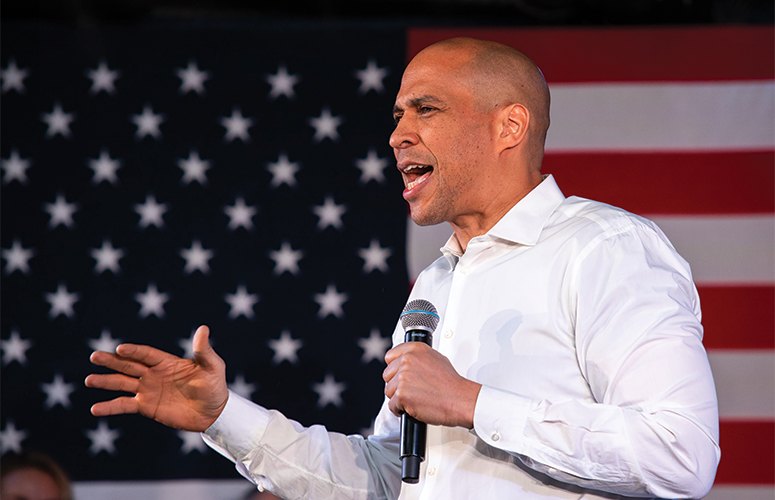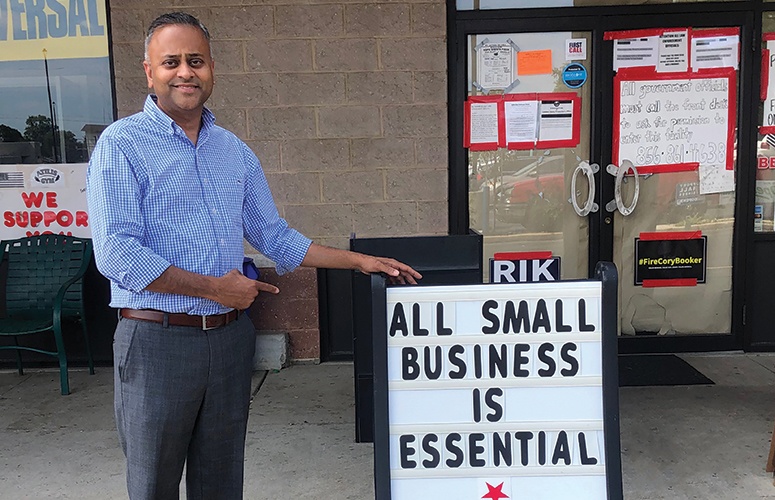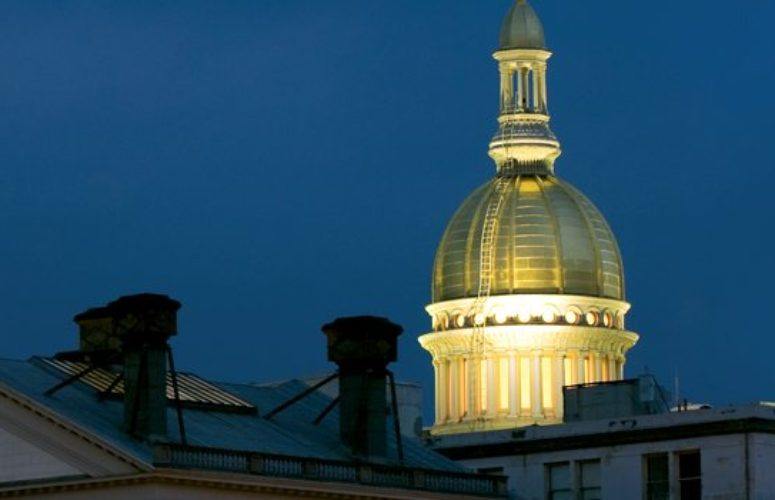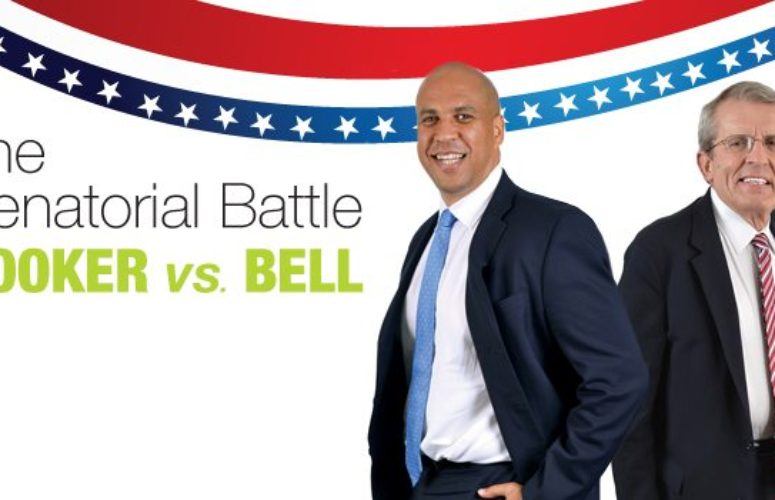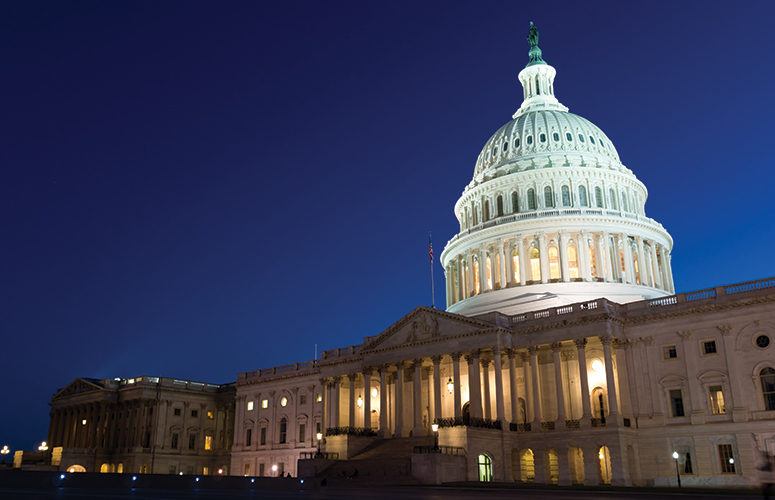
Booker vs. Mehta: the Senate Race
By Anthony Birritteri, Editor-in-Chief On Oct 6, 2020New Jersey Business magazine has a long tradition of delivering in-depth, impartial interviews with both the Democratic and Republican US Senatorial candidates from New Jersey during each Senate election cycle. On the following pages, Democratic Senator Cory Booker, the incumbent, and Republican challenger Rik Mehta, answer a series of questions covering the spectrum of business, health and social issues that are continuously in the headlines today. They include: the COVID-19 pandemic; the related closure and opening of businesses, as well as unemployment and job creation; social justice; immigration reform; and the polarization of party politics, to name a few concerns.
The candidates have competing views, albeit sometimes their views veer towards being similar. Regardless of what their beliefs are, one thing is certain; they both want the best for all New Jersey businesses and its citizens.
What follows are their opinions and proposed initiatives to make the state and country a better place to live, work and prosper.

Cory Booker Q&A
Q: What are your thoughts on how the federal government has been addressing the COVID-19 pandemic, and what will you strive for in the Senate to help NJ and the nation overcome the illness?
A: At just about every opportunity this Administration has had to meaningfully protect Americans and stop the spread of the virus, it has failed to do so. Even with more than 180,000 of our loved ones killed by COVID-19, we can still take steps today to save lives. I am advocating for policies to increase access to affordable care, protect our nursing home residents and workers, provide targeted support to communities of color, strengthen our public health workforce, increase access to personal protective equipment (PPE) and other supplies, and ensure that New Jersey gets its fair share of support commensurate to the burden we have experienced from this virus.
Q: What would your efforts be in ensuring businesses fully reopen in a quick, but safe manner?
A: Small businesses are hanging on by a thread. And while initiatives like the Paycheck Protection Program (PPP) provided businesses with short-term emergency assistance to keep employees on the payroll, (businesses) need more help – and fast. It’s why I am fighting to pass my bipartisan legislation, the RELIEF for Main Street Act, which would provide New Jersey with more than $1 billion in emergency relief funds to provide flexible grants and financial assistance to the smallest small businesses. I also support a second round of the PPP, as well as longer-term working capital loans that do not need to be repaid. Together, these programs would provide small businesses with capital to not only maintain employees and cover expenses like rent and utilities, but also to make necessary investments in PPE and other equipment so that they can reopen safely.
Q: As a perpetual donor state, do you feel NJ has received its fair share of COVID-19 assistance and what can you do to ensure it does so going forward?
A: Without a major influx of resources from the federal government, New Jersey will need to make cuts to critical public services, including laying off essential workers like police, firefighters, paramedics and teachers, and raise taxes at a time when our families and communities are already hurting. It’s why I joined Senator Menendez in introducing the SMART Act. One of the very few bipartisan bills in Congress to provide emergency assistance to states and municipalities, it would provide $500 billion to state and local governments to maintain critical emergency services, expand testing capacity, and provide financial assistance to small businesses and residents.
Q: Beyond the pandemic, what are your thoughts or plans on growing the US economy and creating jobs? As we saw coming out of the Great Recession, it took NJ 10 years to make up for the jobs lost during that downturn.
A: More than a decade since the start of the Great Recession, many New Jersey families have still not recovered. Many communities are seeing stagnant wages and few new business openings – a dynamic only exacerbated by the COVID-19 pandemic.
To move our country forward, we need to first provide emergency assistance to laid-off workers and shuttered small businesses. Not only is it the right thing to do, it’s the smart thing to do to limit the economic hole we have to dig out of. Next, as we emerge from the acute phase of COVID-19, we must invest in pro-growth policies that create a more dynamic and thriving New Jersey economy, including reforming the tax code to reward work over wealth, boosting access to capital to small and underserved businesses, and safeguarding the US supply chain through unprecedented investment in domestic manufacturing.
Q: How do you plan to address the issue of social justice, equality and fairness for the citizens of our diverse state and country?
A: I hope that we, as a country, come to understand that we need each other, and that the work of anti-racism must be the priority of everyone, not just people of color. It is not enough to be a non-racist; we all need to be actively working against racism wherever it is in ourselves or in others. I also believe the words of Dr. Martin Luther King Jr. who said: “While it may be true that morality cannot be legislated, behavior can be regulated. It may be true that the law cannot change the heart, but it can restrain the heartless. It may be true that the law cannot make a man love me, but it can keep him from lynching me …” We have to change our laws: from policing oversight and accountability to our criminal justice system to environmental protection and environmental justice. We have the power to do that through voting – not just in presidential elections, but everything from the Senate to your local school boards, and by speaking out and standing up.
Q: Where do you stand on immigration reform and the many challenges our country is facing in this arena, from both a humane and business perspective?
A: Our immigration system should reflect our values. Separating children from their families, the abusive and indefinite detention of immigrants, and shutting the door to desperate refugees does not reflect who we are and who we aspire to be as Americans. As your Senator, I work to fix our broken immigration system by bringing stakeholders to the table – including immigrants, communities, labor unions, and employers to craft common sense policies for an immigration system that recognizes the many contributions that immigrants make to our country, show American leadership, treat immigrants with dignity, and create shared prosperity and economic growth.
Q: What are your thoughts on the proposed $1.5-trillion infrastructure bill that passed in the House and is now in the Senate? Whatever is passed, what would you do to make sure NJ benefits from the bill?
A: I strongly support the Senate following the House of Representatives’ lead and passing a major infrastructure package. The $1.5-trillion House bill would provide investment for a broad range of pressing infrastructure needs in our country, with a strong focus on reducing emissions and addressing climate change. As a member of the Environment and Public Works Committee, I have worked with my colleagues in Congress on a bipartisan surface transportation bill and a comprehensive water infrastructure bill. I will continue to push for the Senate to pass these critical pieces of legislation while also considering a broader infrastructure package similar to what the House has passed. Of particular importance to New Jersey, the House bill includes significant funding for transit and rail programs, which are essential to help drive investment to New Jersey and ensure that we continue to move forward on the Gateway Project.
Q: Hospitals, businesses and residents had a hard time getting PPE supplies during the pandemic. One of the reasons for this was that manufacturing of such equipment was done overseas. What is needed to bring manufacturing back to the US for products such as PPE?
A: I couldn’t agree more on the need to safeguard our supply chains and promote domestic manufacturing of products like PPE. It’s why I am working with Democrats and Republicans to advance my legislation, the Scale-Up Manufacturing Investment Corporation Act, as part of any future legislative activity. The bill would provide new funding to the US Small Business Administration for the sole purpose of jumpstarting growth capital for small manufacturers who commit to building in America.
Additionally, this administration failed to effectively utilize the Defense Production Act (DPA) to expand production of PPE and other supplies and has continued to force states, localities and health systems to bid against each other for these essential items. Moving forward, particularly as we continue to ramp up testing and eventually have a vaccine to distribute, the administration must effectively utilize the DPA and implement a strategic plan to ensure that we have sufficient supplies and that they are distributed in an equitable manner.
Q: Congress continues its battle over the Affordable Care Act. What are your initiatives to lower or at least control healthcare costs while making sure quality care is delivered to US residents?
A: While we work toward the ideal of a Medicare for All system, we need to build upon the Affordable Care Act to ensure that all Americans have access to affordable, quality health coverage – including the creation of a public option and expanding Medicare. We need to address the rising cost of care itself, including prescription drugs. I have introduced and supported legislation to allow Medicare to negotiate the price of prescription drugs, import prescription drugs from Canada, impose an out-of-pocket cap on drug spending, increase competition with lower cost, generic drugs, and enable the federal government to review the rising list price of prescription drugs.
Q: What is your stance on the current state of environmental regulations relative to how they protect our environment, while, at the same time, not hindering responsible growth for business and industry?
A: The Trump administration has dismantled, or is dismantling, over 100 major climate and environmental regulations. These rollbacks will result in the sickness and premature death of tens of thousands of Americans, disproportionately those living in low-income communities and communities of color. The rollbacks will be bad for businesses. We have decades of data that shows that a cleaner environment goes hand in hand with economic growth. We need to strengthen our environmental laws – not only to safeguard public health, but also to protect our economy, which will be hit harder by the effects of climate change.
Q: There is perhaps no greater issue than the polarization of politics and the viewpoints of citizens on the conservative right and liberal left. What will you do to bring the Democrats and Republicans in Washington and US citizens together?
A: You can be most successful when you find common ground, bring people together, and build unusual coalitions that break down partisan divisions. As mayor, I took on some of Newark’s biggest challenges by bringing together a diverse coalition of people to deliver real change for residents. As Senator, I have written and championed dozens of bills that address our broken criminal justice system, expand economic opportunity, and fight for equal justice. We’ve turned those ideals into law, including the First Step Act – a bipartisan bill that makes meaningful reforms to our criminal justice system and begins to reverse the injustices of mass incarceration, and Opportunity Zones, one of the most significant economic development programs to come out of Congress in a generation.
Cory Booker: A Biography
When Cory A. Booker was interviewed by New Jersey Business magazine in 2014 regarding his re-election bid for his first full term as US Senator, he said his father once stated: “This is a country where you can have free and equal access to make the best of yourself.”
Today, as the nation deals with social injustice issues, Booker, who is the first African-American to be elected US Senator from New Jersey, says he is in the national struggle to make sure people of all races and religions still have the “equal access” about which is father spoke.
When asked how he plans to bring US citizens on the extreme left and right together, as well as Democrats and Republicans in Washington, D.C., he responds: “I believe you can be most successful when you find common ground … and build unusual coalitions that break down partisan
divisions. The lines that divide us are nowhere near as strong as the ties that bind us.”
Booker was born in 1969 in Washington, D.C. His parents were civil rights activists and among the first black executives at IBM. The family would move to Harrington Park, New Jersey, where Booker was raised.
Booker’s path in public service can be traced back to his college days when he served as senior class president at Stanford University. There, he received a bachelor’s degree in political science (1991) and a master’s degree in sociology (1992). He then attended The Queen’s College, University of Oxford in England, as a Rhodes Scholar, receiving a graduate degree in 1994. In 1997, he earned his Juris Doctor from Yale Law School, where he operated free legal clinics for low-income residents in New Haven.
Upon graduation, he moved into a public housing project in Newark where he fought for tenant rights. He soon ran for public office, winning election on the Newark City Council, serving from 1998-2002. In January of 2002, Booker announced his candidacy for Newark Mayor, but lost the election to longtime incumbent Sharpe James. In early 2006, he again announced his candidacy for mayor. James initially filed papers to run, but then dropped out of the race. Newark Deputy Mayor Ronald Rice was James’ replacement. Booker defeated Rice by garnering more than 72% of the vote … the largest landslide in Newark history.
In October of 2013, Booker won a special election to fill the US Senate seat left vacant due to the death of Senator Frank Lautenberg. The following year, he would defeat Republican challenger Jeff Bell for the same seat. In the 2016 presidential election, Booker was on Hillary Clinton’s short list of vice-presidential running mates. Though not chosen, he did speak to a prime-time national audience on the first night of the Democratic National Convention.
The path was set for Booker to run for US president. On February 1, 2019, the first day of Black History Month, he announced his presidential candidacy via Twitter and video link. As the campaign season progressed, however, polls favored other candidates and Booker dropped out of the race this past January.
Today in the Senate, Booker serves on the Small Business and Entrepreneurship Committee; the Judiciary Committee; the Foreign Relations Committee; and the Environment and Public Works Committee.
Rik Mehta Q&A
Q: What are your thoughts on how the federal government has been addressing the COVID-19 pandemic, and what will you strive for in the Senate to help NJ and the nation overcome the illness?
A: We had a strong and well-coordinated federal response including the early closure of air travel, stockpiling the largest supply of ventilators, and procuring hundreds of millions of personal protective equipment (PPE), allowing for a quick reduction in our transmission rates – i.e. flattening the curve. As a result, the US experienced one of the lowest case fatality rates in the world and our hospitals did not experience protracted overcrowding.
It is important to contrast that to New Jersey, which had one of the worst responses out of any of the states in the country because the governor and the two sitting US Senators were unprepared, unequipped, and unreasoned. New Jersey saw the highest death rate from COVID-19 in nursing homes in the country. Moreover, New Jersey continues to experience the highest death rate out of any state per 100,000 people. This is unacceptable. Because there was no science-based plan from the onset, Governor Murphy failed our elderly while decimating our small businesses. I appreciate the Federal Department of Justice launching an investigation into the governor’s mishandling of our nursing home victims.
As your next US Senator, I will use the dais to lead collaborative discussions with various health agencies towards developing high sensitivity, point-of-care diagnostics, expanding the use of our pharmacists for testing, supporting doctors and nurses to make bedside medical decisions without government overreach, and passing legislation to accelerate the approval of therapeutics, not just vaccines.
Q: What would your efforts be in ensuring businesses fully reopen in a quick, but safe manner?
A: We need well-reasoned, regional plans grounded in science that allow for the local reopening of our businesses through evidence-based risk mitigation and local oversight. Despite numerous requests, I have yet to see Governor Murphy or his administration provide well-reasoned, scientific documents supporting their executive orders that call for a “one-size-fits-all” approach to over-regulating our businesses out-of-business. Where is the scientific evidence to support keeping gyms at 25% capacity as opposed to 50% or even 100% capacity? On the economic side, 25% of revenue for any small business would mean operating at a loss. Career politicians, like Cory Booker, have become comfortable at punishing all for the sake of some. At this point, we do not need public health policy; we need healthy public policy that considers the totality of the circumstance.
Q: As a perpetual donor state, do you feel NJ has received its fair share of COVID-19 assistance, and what can you do to ensure it does so going forward?
A: It’s absolutely true that New Jersey taxpayers send more to the federal government – and get back less – than any other state. And in the throes of the pandemic, Governor Murphy has the audacity to raise more job-crushing taxes, overburdening an already depressed state economy. Our businesses and towns still need more federal aid. While we have received billions in support, New Jersey still needs additional aid to dig out of the hole created by Governor Murphy. We must put partisan politics aside and help our communities stay afloat.
Q: Beyond the pandemic, what are your thoughts or plans on growing the US economy and creating jobs? As we saw coming out of the Great Recession, it took NJ 10 years to make up for the jobs lost during that downturn.
A: As New Jersey’s next US Senator, I will put America first and bring our medical manufacturing from overseas back to New Jersey. My policies will create thousands of jobs, reduce our tax appropriations spent on foreign manufacturing, and lower the price of prescription drugs all while strengthening our national security. Additionally, New Jersey has a spending problem and we need to get that under control, otherwise no matter how many jobs we create or money the federal government sends, it will never be enough. Unfortunately, Senator Booker and his cronies in the state Legislature have made New Jersey non-competitive with our neighbors both here in the US and globally … all they do is push higher taxes, more regulation, and make the state unaffordable for employees to live near their places of employment.
Q: How do you plan to address the issue of social justice, equality and fairness for the citizens of our diverse state and country?
A: While I am proud to be the first person of color to win the US Senate nomination for the Republican Party in New Jersey, we are not trapped in 1967. We certainly have work to do to ensure we are leaving this generation better for the next, but we also need to elevate the conversation and move beyond identity politics. While I support the right to peacefully protest, I cannot accept the acrimonious behavior by rioters and anarchists who want to burn down our buildings, make our streets unsafe and rip apart the fabric of our culture. As your next US Senator, I will work closely and tirelessly with my colleagues across the aisle to end the divisiveness and introduce meaningful reforms that move us forward. My election will offer hope and an opportunity to end the racial conflicts, violence and unrest.
Q: Where do you stand on immigration reform and the many challenges our country is facing in this arena, from both a humane and business perspective?
A: My story started 50 years ago when my father immigrated here through the legal process with only a $100 in his pocket. My mother worked two jobs and managed the household. Our story is like a lot of people in New Jersey; humble beginnings, hard work, and a belief that the American Dream is available to anyone willing to chase it. I have gratitude for the country that has given my family so much and deep appreciation for the process my parents took to become Americans. Today, our legal process for immigration continues to be undermined by those who do not follow the law. I will support a secure border and assure that the laws intended to maintain a safe and sovereign nation are enforced. At the same time, it is imperative that we reform our broken legal immigration system and reduce the backlog of reviews. At a time where we need doctors, over 20,000 physicians are stuck in visa purgatory. That’s unacceptable.
Q: What are your thoughts on the proposed $1.5-trillion infrastructure bill that passed in the House and is now in the Senate? Whatever is passed, what would you do to make sure NJ benefits from the bill?
A: America desperately needs an infrastructure bill. What we don’t need is a trojan horse that would backdoor billions in funding from real infrastructure projects into pushing onerous, job-killing climate policies as proposed by the partisan, Democrat House’s $1.5-trillion infrastructure bill. In the Senate, I would assure that any infrastructure legislation also makes provisions for information technology upgrades for state governments to operate more efficiently.
Q: Hospitals, businesses and residents had a hard time getting PPE supplies during the pandemic. One of the reasons for this was that manufacturing of such equipment was done overseas. What is needed to bring manufacturing back to the US for products such as PPE?
A: The U.S. Food and Drug Administration is ripe for disruption. As a former FDA official, I have personally witnessed administrative employees get entangled in a “regulatory pretzel” where conflicting guidance and regulations create analysis paralysis. As part of my policy platform, I am proposing to shorten the FDA review time without compromising safety and efficacy reviews, and expanding ‘early access’ programs for therapeutics available as Investigational New Drugs. A simple legislative change could create a new pathway, save billions of dollars and save many lives. We also need new technologies and tools to expedite the FDA review process and [improve] the way FDA communicates with medical development teams. We also need to consider the use of Opportunity Zones to bring medical manufacturing back to New Jersey and renovate our blighted areas. My policies will create thousands of jobs and reduce our tax appropriations spent on foreign manufacturing.
Q: Congress continues its battle over the Affordable Care Act. What are your initiatives to lower or at least control healthcare costs while making sure quality care is delivered to US residents?
A: As a former clinical hospital pharmacist at a top university hospital, I have seen the best of our healthcare professionals and the worst of our American healthcare system. Medical care and drugs are too expensive. Health insurance deductibles are outrageously high and often, fees are hidden. For many, health insurance is still unaffordable. The US has the highest healthcare costs of any country in the developed world, yet we lag other developed countries in life expectancy, [have a higher] infant mortality rate, and more early deaths by heart disease.
Our doctors now practice “administration” more than they practice “medicine.” There are too many regulatory burdens imposed on medical professionals, too much needless paperwork, too little competition among healthcare providers and health insurance companies. Insurance providers are forced to issue one-size-fits-all policies that force consumers to pay for care they don’t need nor will ever use. The federal and state governments cannot possibly regulate every aspect of American healthcare and expect it to work; and yet that’s what the Affordable Care Act did. The marketplace must do what it does best – create competition among health insurers, hospitals and medical providers, and allow insurers to sell customized policies tailored to the needs of customers.
Q: What is your stance on the current state of environmental regulations relative to how they protect our environment, while, at the same time, not hindering responsible growth for business & industry?
A: We need to pare back cumbersome regulations that do not serve their intended use and stifle our economy. Some regulations are extremely over the top and prevent markets from expanding and jobs from being created, while others that ensure clean air and water are necessary.
Q: There is perhaps no greater issue than the polarization of politics and the viewpoints of citizens on the conservative right and liberal left. What will you do to bring the Democrats and Republicans in Washington and US citizens together?
A: I’m going to Washington, D.C. to get things done for the people, not for special interest groups. We will reach beyond our traditional base to non-traditional conservative communities, minorities, women, young people, and those, like us, who love America and love God. It’s time New Jersey got a fresh face in the US Senate with bold ideas, and a vision to make New Jersey a place to live, not leave. Let’s be ‘Jersey Proud,’ together!
Rik Mehta: A Biography
Only July 7, 2020, Rik Mehta became the first Indian-American to win the Republican primary for US Senator from New Jersey.
It was a close race. Mehta won the primary by just 8,684 votes (154,817 to 146,133) against Hirsh Singh – also an Indian American, a 2018 primary candidate for the House of Representatives, and a 2017 primary candidate for governor. New Jersey Secretary of State Tahesha Way certified the primary results on August 9, with Mehta named the winner, yet Singh, at press time, continues to contest the results.
This is the first time Mehta is running for public office. He tells New Jersey Business, “My story started 50 years ago when my father immigrated to the US (from India) through the legal process with only a $100 in his pocket. My mother worked two jobs and managed the household. Our story is like a lot of people in New Jersey; humble beginnings, hard work, and a belief that the American Dream is available to anyone willing to chase it.”
He says his parents chose America because they knew it was the only country in the world that allowed for the vast opportunities they sought. “I have gratitude for the country that has given my family so much, and deep appreciation for the process my parents took to become Americans,” he says.
Mehta is a biotech entrepreneur, healthcare policy expert, and a licensed pharmacist and attorney whose professional career spans both the public and private sectors. He is the co-founder and sits on the board of two privately-held companies: Licentiam, Inc., and Lactiga Therapeutics. The first company is a regulatory technology firm built to reduce paperwork burdens imposed on doctors by state governments. The latter is a biotherapeutics company developing novel, oral immunoglobulin treatments targeting rare diseases. Mehta is also the principal of his own consulting firm, R&R Strategies, which helps companies navigate regulatory processes created by government administrations in the healthcare space.
In the public sector, Mehta worked at the US Food and Drug Administration as a Consumer Safety Officer to advance policies to expedite and increase access to quality, affordable drugs and healthcare. He also fought against pharmaceutical companies that marketed unapproved drug products, many of which were opioids. His enforcement actions resulted in the removal of many illegally marketed opioids, which helped in the fight against the opioid crisis. He says he has deep expertise in untangling the unnecessarily and complicated regulations that make drugs expensive and healthcare unaffordable. “The country needs real healthcare reform driven by competition and innovation, not government control,” he says.
His professional experience also includes teaching as an adjunct professor at Georgetown University Law Center and Rutgers University’s School of Health Professions.
Mehta received his B.S. in pharmacy from Rutgers University, his Pharm.D. from the University of Arkansas for Medical Sciences, his J.D. from Rutgers University School of Law and a Master of Law in Global Health Law and International Institutions through a joint program with the Georgetown University Law Center and the Graduate Institute for International and Development Studies in Geneva, Switzerland.
He lives in Morris County where he and his wife Reema are raising their three sons. Reema is a scientist and a former FDA official who currently works as a drug safety science leader at Pfizer where she is also a member on the FDA Advisory Committee in drug safety and risk management. The couple met at their alma mater, Rutgers University-New Brunswick, where they married.
To access more business news, visit NJB News Now.
Related Articles:


